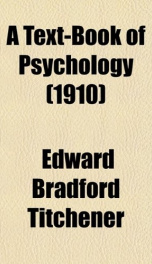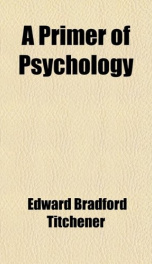a text book of psychology

Purchase of this book includes free trial access to www.million-books.com where you can read more than a million books for free. This is an OCR edition with typos. Excerpt from book: A TEXT-BOOK OF PSYCHOLOGY SUBJECT-MATTER, METHOD AND PROBLEM OF PSYCHOLOGY § j. Science and Experience. A science consists of a large body of observed facts, which are related to one another, and are arranged under general laws. If, for instance, you open a text-book of physics, you find that it gives the results of numerous observations, or prescribes experiments in which you are to observe for yourself ; and you find that these results or experiments are grouped under certain main headings (mechanics, heat, electricity) and are made to illustrate certain comprehensive laws (Newton's laws of motion, Kirchhoff's law of radiation, Ohm's law of the strength of the electric current). All scientific text-books, whether the science is physics or chemistry, biology or psychology, philology or economics, are of the same pattern. It is worth while, before we begin our special study of psychology, briefly to consider some of the questions which this definition of science suggests. How, we may ask, do the various sciences come into being ? How are they differentiated, their several fields laid out and marked off? What do we mean when we say that the facts of any given science are related to one another? What is the nature of the relation ? What precisely is a scientificlaw ? Why is it important for the progress of science that laws should be established ? An answer, even a rough answer, to these questions will help us to understand the scope and aim of psychology. First of all, then, it is plain that all the sciences have the same sort of subject-matter; they all deal with some phase or aspect of the world of human experience. If we take a mere fragment of this world, say, our own experience, during a single day,we find it a rather hope- O..ua less mixture. Our lawn-sprink...
Info about the book
Author:
Series:
Unknown
ASIN:
B002WTNBUI
Rating:
3.5/5 (4)Your rating:
0/5
Languge:
English
Users who have this book
Users who want this book
What readers are saying
What do you think? Write your own comment on this book!
write a commentGenre
if you like a text book of psychology try:
Do you want to read a book that interests you? It’s EASY!
Create an account and send a request for reading to other users on the Webpage of the book!



